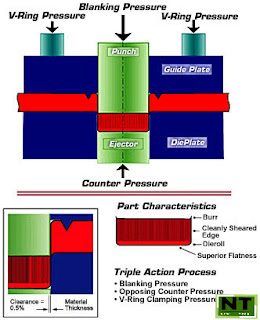Working Of Metal Stamping Process And It’s Methods
Metal Stamping is a system
of processes used in automotive industry to focus on metal manufacturing. The
process is to make the metal components into different moulded designs and
sizes. The process is mainly said to be the art of metal working.
The process is mainly
responsible for a method of operation such as punching, blanking, piercing,
drawing, bending, flanging, embossing, forming and coining along with the
metals as needed. These stages of operations with stamping are carried out until
the metal forms desired shape and respective material is achieved.
The metals are being
cut, formed and shaped by feeding and pressing the metals between tonnage stamping
dies. This is majorly done in mass production industries and the parts are
developed with this process and it generally consumes low cost value.
Progressive Metal
Stamping is a form of metalworking method, in which the operations of stamping
are made with a single machine. Using a progressive Metal Stamping die and
reciprocating machine press stamping operation is done. The progressive metal
stamping die is placed into a reciprocating Metal Stamping press and as the
press moves up, the top die also moves along with it and this allows the
material to feed into press. And when the press moves down, the die closes and
performs the stamping operation. With each stroke of the press, the desired
metal is carried out from the die of Stamping On Metal.
In every automotive
industry, the quality assurance is being employed before and after the metal
stamping process activity. General requirements needed for quality assurance
separated into two categories. The pre-processing includes operator safety and machine
press precision and post-processing requirements includes product dimensions,
hardness and other quality conformances. And finally the requirement process is
ensured by the technology called stamping stimulation. The stamping stimulation
process prompts product defects and predicts lead time and production cost.

No comments:
Post a Comment